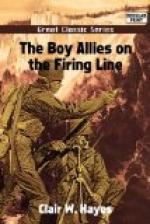He broke off and shrugged his shoulders significantly, then continued:
“Then no doubt that big gray dog I stumbled over outside—and which almost bit me—is the property of your prisoners.”
Hal stepped forward and saluted.
“He is, sir,” he said.
The old general eyed the lad for some minutes in silence. Hal bore the scrutiny without flinching. Then the general turned to Chester and repeated the process. Chester also met his gaze squarely.
“Humph!” ejaculated the German commander; then turned suddenly to his son.
“When you have introduced us,” he said, “we shall all go in and have something to eat!”
CHAPTER XXXII.
A piece of paper.
Upon the two following days Hal and Chester, in company with the young German lieutenant, viewed the sights in the German capital. Instead of the peaceful, pleasure-loving city of their vacation, it now bore naught but signs of war.
Officers in automobiles, afoot and on horseback, were rushing hither and thither continually. Troops were moving through the streets of the city upon every hand—some preparing to entrain for the west, and some for the east, where even now it was known that the great hordes of the Czar of all the Russias were approaching as fast as their vast numbers would permit.
It was indeed a scene to delight a war-like eye, and it was not lost upon the two lads.
“It’s going to be an awful job to lick these fellows,” Chester confided to Hal, as they strolled about one afternoon.
“There is no question about that,” was Hal’s reply. “Still, it has to be done.”
“And will be done eventually,” declared Chester grimly. “The trouble is that we are not likely to see it done.”
“Don’t lose heart,” said Hal. “Something may turn up. You never can tell.”
And something did turn up, though it was nothing the lads could possibly have anticipated. As they walked down the street a squad of German soldiers approached, in their center a man in civilian clothes. Lieutenant Strauss and the boys approached them.
As the three neared, the officer in command of the squad called a halt.
“What have we here?” asked Lieutenant Strauss.
“A spy, sir,” was the reply.
“Where was he found?”
“About thirty miles west of the city.”
“How does he account for his presence there?”
“He has not had much to say,” replied the officer, “but he did tell me that he fell from an aeroplane.”
“Does he deny being a spy?”
“He does, sir.”
“Then how does he account for the fact that he wears no uniform?”
“He doesn’t account for it at all, sir. He refuses to say anything on that score.”
Hal and Chester, during this conversation, had drawn as close to the prisoner as the armed guard would permit.




